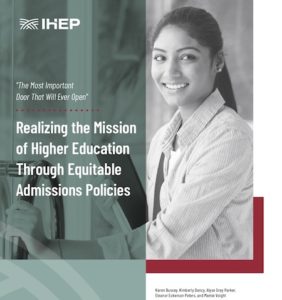 A new report from the Institute of Higher Education Policy finds that there are eight recruitment, admissions, and enrollment policies and practices that may seem neutral in intent have an inequitable impact on Black students and other underrepresented groups or students from low-income backgrounds.
A new report from the Institute of Higher Education Policy finds that there are eight recruitment, admissions, and enrollment policies and practices that may seem neutral in intent have an inequitable impact on Black students and other underrepresented groups or students from low-income backgrounds.
Specifically, the report looks into the impact of recruitment practices; demonstrated interest policies; early admissions deadlines; legacy admissions; use of standardized testing; use of criminal justice information; developing effective transfer policies; and need-based financial aid policies on equal access to higher education.
The report and accompanying advocacy tools set forth actionable recommendations for policymakers and practitioners at colleges and universities – and, where relevant, for state and federal policymakers – to reexamine current recruitment, admissions, and enrollment strategies and put equity at the forefront.
Mamie Voight, interim president of the Institute for Higher Education Policy, said that “in the face of disparities in college access and attainment by race, ethnicity, and income-level, now is not the time to hope for change in spite of long-standing policies. Now is the time to rethink these policies. Now is the time for institutions to use all of the tools at their disposal, including recruitment, admissions, and enrollment policies, to promote equity. For the door to be open to all of today’s students, regardless of race, ethnicity, or income, we must have our eyes open to the impact of each policy and practice.”
The full 106-page report, The Most Important Door That Will Ever Open: Realizing the Mission of Higher Education Through Equitable Recruitment, Admissions, and Enrollment Policies, may be downloaded here.


It is difficult to understsnd why so many seemingly sensible African-Americans continue to demand a society of equal outcomes across the field of education.
People are not the same. “Equity” is a very bad idea. And no, criminal background checks are not a barrier to higher education. They are absolutely essential to screen out unsuitable individuals from university campuses. Standardized tests help ensure that scarce education resources are not wasted on students who do not have much academic ability.
It appears this ‘defender of white supremacy and street urchin’ who self-identifies as ewart need to direct this same outrage towards those millions of low performing Whites who fall in this category that so happily pontificates about. Idiot.
Just legalize quotas and be done with it. Blacks can have 13 percent and use whatever admissions procedure they want (hint: HBCUs use standardized testing, which seems to work fine if there are no whites or Asians in the applicant pool).
The idea that you can somehow tweak a complicated multifactor system so that blacks will magically appear to naturally be admitted proportionally to the population is a pipe dream. Nobody is fooled. The students themselves are the end result, and professors and fellow students can size them up in no time.
Here we go again, another so-called White supremacist apologist in 2021. I would venture in saying that your dimwitted commit is not even worthy of any sort of substantive response. I just bet Hernstein and Murray are your ideological role models.